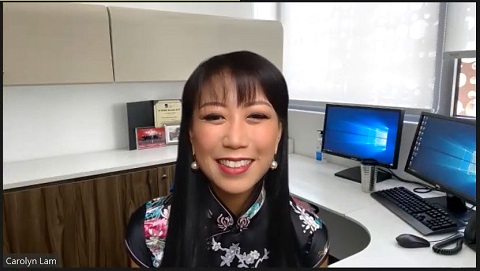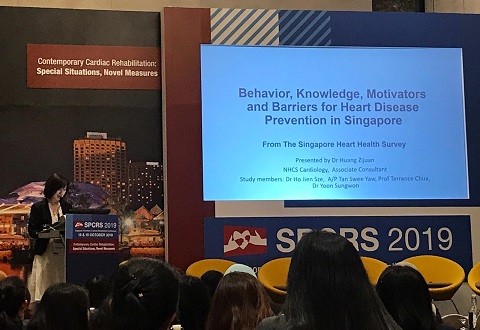Besides providing clinical care for our patients, three of our NHCS doctors have been making waves in the research arena and are proud recipients of the latest National Medical Research Council (NMRC) Awards.
Have you wondered why one would suffer from heart failure or what could help prevent a heart disease? A medical research usually starts with unanswered questions like these. Through research, our researchers and doctors gain more knowledge about cardiovascular conditions, and how the human body and heart work. It also allows them to discover answers to their questions that could potentially lead to new advances and discoveries of treatments and strategies to improve the care of heart patients.
Besides providing clinical care for our patients, three of our NHCS doctors have been making waves in the research arena and are proud recipients of the latest National Medical Research Council (NMRC) Awards. The NMRC Awards are national grants presented to clinician scientists and researchers to conduct translational and clinical research in Singapore – to transform patient care with research.
Our award recipients tell us what it is about research that excites and appeals to them.
Clinician Scientist Award (CSA) - Senior Investigator
Prof Carolyn Lam, Senior Consultant, Department of Cardiology

Prof Carolyn Lam is seen here sharing on her research interests over a virtual interview.
“It began with a curiosity inside me – to venture beyond what is already known. In medicine, we study the medical textbooks, and follow guidelines and established practices. But it has always been a calling within me to find out if there are better and more innovative ways to do things,” shared Prof Carolyn Lam, Clinician Scientist and lead of National Heart Research Institute Singapore’s (NHRIS) heart failure with preserved ejection fraction (HFpEF) and Women's Health research theme.
She added, “Research to me is a curiosity that one can’t suppress; and a creativity that will find expression somewhere, somehow! No doubt it can be tiring to juggle research in addition to clinical training and patient care, but researchers are people who would continue striving towards discovery.”
“We’re currently working on a multi-centre study across six regions in the world (with a network of worldwide investigators and collaborators) on the prevention of heart disease and strokes in diabetic patients building. The clinical trial - Asian Diabetes Outcome Prevention Trial (ADOPT) which took many months of planning was finally launched with great support from NMRC, industry and philanthropic partners,” Prof Lam shared, evidently excited about her latest work.
With her busy schedule, Prof Lam mused that she sometimes finds herself needing to be a chameleon, “While working in different countries, I had to adapt to the diverse cultural and gender norms of the countries. For instance, I have to be mindful that the Singaporean in me might appear as too rude and over-bearing or, conversely, too meek to lead when I’m in India, Japan or the Middle East. Despite the challenges faced, I believe that treating others with grace and courtesy wins the day, and hard work speaks volumes. So I always make sure to roll up my sleeves and get things done.”
There are times when Prof Lam would write papers or grants, and have conference calls all through the night, “To me, there are three key ingredients for success in research – (1) knowing yourself well and what you truly want to do; (2) having a good mentor; and (3) having support from your institution and country. I especially want to thank NMRC for believing in me, and the multiple mentors that I have.” She added that one of her first mentors was Prof Ling Lieng Hsi from National University Hospital, and while she has had many mentors from overseas as well, notably her first female mentor, Margaret Redfield, truly inspired her.
“The best part of being a researcher is investing in the future generations. I’m so proud of the work my mentees have accomplished. My mantra is to bring out the best in others, and if I’ve managed to do that in any small way and see my mentees supersede me or our generation, that is the greatest reward!”
MOH Healthcare Research Scholarship – Master of Clinical Investigation (MCI) Programme
Dr Huang Zijuan, Consultant, Department of Cardiology

Dr Huang sharing on a heart disease prevention study at the Singapore Prevention & Cardiac Rehabilitation Symposium 2019.
“While I am relatively new in research work, I do get interesting ideas in the course of my clinical work and I greatly appreciate the opportunity to answer any gaps in clinical care through research. The MCI programme is also well-suited for clinicians who regularly work on causes, diagnosis and treatment of disease,” said Dr Huang Zijuan who clinched the MOH Healthcare Research Scholarship - Master of Clinical Investigation (MCI) Programme.
“Part of the research work I’m working on is building a SPECT (single photon emission computed tomography) MPI (myocardial perfusion imaging) database combined with clinical data which has multiple applications in improving testing techniques and test selection,” Dr Huang enthused. With the MCI programme, she hopes to enrich her research knowledge and pursue research of her interest, and to learn how to incorporate research into clinical practice.
When asked about her learning journey thus far, Dr Huang has some quotes to share, “Finding the right research topic means first finding the itch that irritates you. Find that itch! - This is the advice by a great research mentor from our MCI programme, Assoc Prof Allen Yeoh. Another mentor shared that research is like climbing mountains, there may be unexpected challenges but one must be prepared at the outset that these will happen, and aim for and scale each peak, one at a time. Last but not least, one of my favourites is from my MCI lecturer who asked - So when should you start writing the grant abstract? – one of the student’s answered Yesterday!”.
NMRC Research Training Fellowship
Dr Chong Jun Hua, Associate Consultant, Department of Cardiology

Dr Chong presenting on Cardio-Oncology, an area she is passionate about, at the Inaugural Asian Cardio-Oncology Society conference series.
“Research and clinical pursuits should go hand-in-hand,” expressed Dr Chong Jun Hua. “A well-versed clinician will be able to identify pain points and pressing patient needs for research that can achieve the largest clinical impact. Increased research uptake among clinicians in Singapore will also maintain our healthcare standing, alongside the best international centres.”
“I am investigating how new pharmaceutical strategies can reduce the size of heart attacks. Concurrently, I am also trying to speed up the analysis time of cardiac MRI (magnetic resonance imaging) scans through artificial intelligence so as to save clinicians' time, and provide patients with timely and accurate diagnosis. I am also a passionate advocate for Cardio-Oncology patients and I believe that this under-represented group will benefit from targeted clinical trials that will guide evidence-based management,” shared Dr Chong.
While embarking on her fellowship, Dr Chong hopes to develop skills and networks to perform meaningful translational research. She shared that her wish is to add to the scientific understanding of cardiac disease through rigorous analysis and write-up, and hopes to form a growing support group of other clinicians who are considering pursuing this clinical-research path.
She added, “I believe that the best researchers live and breathe research, they are constantly on the look-out for how to add value through clinical impact. Perhaps the infamous bench-to-bedside ‘valley of death’ will truly be bridged when clinician researchers become mainstream and lead coordination of our other valuable colleagues including scientists, epidemiologists, public health/health systems experts and engineers.”
"Be authentic and follow your instincts. While I’m still discovering the ingredients for a successful research career, here are some of the insights I have gathered in my journey so far: Be brave and always venture beyond your comfort zone because research is outward-looking and inclusive. Success often means having to fail fast and fail often, because nothing succeeds like failure.”
Wise insights by our enterprising researchers – we wish you all the best in your explorations!
*Awards from the Nov 2018 – Nov 2019 NMRC grant cycles
